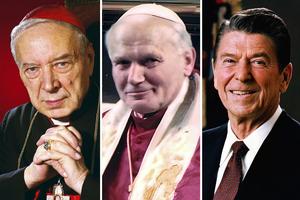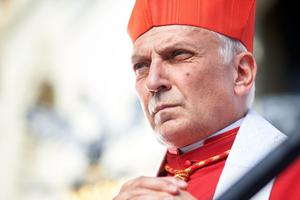John Paul II’s Hero: Stefan Wyszyński Faced Communism With Clear Eyes and a Steel Spine
The ‘Primate of the Millennium,’ Cardinal Stefan Wyszyński, will be beatified in Warsaw on Sept. 12.

“The modern world needs to be reminded of the great truth that men are called for eternal life and that their life does not end here, on earth. Our faith in eternal life has a very important meaning: it teaches us to respect men. We must always remember that man is the most important, most precious, most splendid work of God.” —Cardinal Stefan Wyszyński, Primate of Poland, May 24, 1964
“The Primate of the Millennium. A great Primate. I was witness to the mission, to his total entrusting of himself, to his struggles, to his victory” —Pope St. John Paul II on Cardinal Wyszyński
In his times, Cardinal Stefan Wyszyński was the soul of Poland. He was the “Primate of the Millennium” because he oversaw a nine-year program of preparation culminating in a nationwide celebration of the Millennium of Poland’s Baptism (966-1966). The nationwide commemorative events made clear that Communism was unwelcome in a faithfully Catholic country.
The Millennium marked the beginning of a road to the Polish Catholic triumph over Communism. The Primate of the Millennium was its principal architect. He was one of the key figures in Poland’s 20th-century history.
The victory would be, first and foremost, spiritual. However, devoted as he was to the Church, Wyszyński was also quite enmeshed in the Polish social and political life. He was an unshakable man who helped save the Church in Poland during the Soviet occupation. He defended the Polish people from the Communists. And he brooked no opposition. Once, in a pastoral letter, he preached: “I am your spiritual father, your shepherd, and the bishop of your souls; I am the apostle of Jesus Christ.” He was a role model for the Catholic elites.
Stefan Wyszyński was born in the village of Zuzela in Russian-occupied Poland in 1901. He lost his mother at an early age. He had a special bond with his father, whom he greatly respected. Wyszyński attended high school in Warsaw and Łomża. He enrolled at a seminary in Włocławek and was ordained priest in 1924. Soon, Father Wyszyński also graduated from the Faculty of Canon Law at the Catholic University in Lublin. Simultaneously, he was involved intellectually in a massive anti-Communist endeavor.
During the Second World War, he had to flee from the Germans. He went into hiding and eventually settled in Laski, where he ministered to the blind. Simultaneously, he served as a clandestine chaplain for the Underground, including during the Warsaw Uprising of 1944.
In 1946, Pope Pius XII appointed Father Wyszyński bishop of Lublin. In 1948, he was elevated to the archbishoprics of Gniezno and Warsaw. Ultimately, he became the Primate of Poland. In 1953, Poland’s Primate was awarded a cardinal’s hat. The Communist authorities barred him from traveling to Rome to receive the insignia of the Cardinal.
At the time, the relations between the Church and Communist state were at their nadir. The Red rulers tried to deprive the Church of its autonomy. Priests and bishops were arrested. In 1953, Cardinal Wyszyński and the Polish episcopate dispatched a letter to government authorities stating that they could compromise no more: Non possumus!
Consequently, soon after, the Primate was arrested and deported from Warsaw to the remote countryside, where he was interned in a monastery.
He was released three years later, when Poland came to a boiling point in 1956. Wyszyński’s public appeals helped to calm the situation down. He spared his nation more bloodshed, as the Communists temporarily liberalized.
In 1957 he finally traveled to Rome to receive the insignia of the cardinalate from Pope Pius XII and take possession of the titular church of Santa Maria in Trastevere.
Although a known opponent of liberal innovation, Cardinal Wyszyński actively participated in the work of Second Vatican Council (1962-1965). He personally handed to Pope Paul VI the letter of the Polish Bishops’ Conference asking that Mary be declared officially the Mother of the Church. In 1964, the Pope duly proclaimed her Mother of the Church.
Stefan Wyszyński was a friend and mentor to Karol Wojtyła, future John Paul II. As Cardinal Stanisław Dziwisz, in A Life with Karol, recalls:
“The most obvious proof of their excellent relations was the fact the archbishop of Krakow (Wojtyła) never failed to demonstrate his great respect for, and transparent loyalty to, the primate. … In addition, the two cardinals had found a way of dividing up their roles and tasks that made it extremely easy for them to work together as pastors. The primate set the direction, the overall strategy, while Wojtyla articulated the theory behind it.”
One of the greatest moments in the life of the primate, and of the entire Polish Church, was the election of Cardinal Karol Wojtyła as pope on Oct. 16, 1978. Cardinal Wyszyński’s mission was fulfilled: “If the Lord has called you, you must take the Church into the third millennium!” he told the newly elected pope. In his speech of Oct. 23, 1978, John Paul II lionized Wyszyński:
“Venerable and beloved Cardinal Primate, allow me to tell you just what I think. This Polish pope, full of the fear of God, but also of trust, is beginning a new pontificate, and would not be on Peter’s chair were it not for your faith which did not retreat before prison and suffering. Were it not for your heroic hope, your unlimited trust in the Mother of the Church! Were it not for Jasna Góra [a famous Marian sanctuary], and the whole period of the history of the Church in our country, together with your ministry as bishop and primate!”
Thanks to Cardinal Wyszyński’s leadership, Poland’s Catholics enjoyed freedom of religion, the freedom of their Church, and justice at a level unmatched anywhere else in the Soviet Bloc. Their Primate defended life and human rights as well. Finally, he constantly praised and supported the maternal vocation of women.
Cardinal Dziwisz witnessed the last, short telephone conversation between the Primate and the Pope. The Primate was on his death bed. The Pope was still recovering in a hospital after the failed assassination attempt:
“You could hear the cardinal’s feeble voice saying, ‘We’re united in suffering … but you’re okay.’ And then: ‘Holy Father, give me your blessing.’ And Wojtyla, though reluctant to pronounce the blessing, because he knew it would be their last goodbye, said, ‘Yes, of course. I bless your mouth … I bless your hands.’”
Cardinal Primate Stefan Wyszyński died May 28, 1981. Unable to attend the cardinal’s funeral, John Paul II wrote in his letter to the people of Poland: “Meditate particularly on the figure of the unforgettable primate, Cardinal Stefan Wyszyński of venerated memory — his person, his teaching, his role in such a difficult period of our history.”
St. John Paul II and soon-to-be Blessed Stefan Wyszyński are no longer with us but they both remain an example of moral clarity and moral leadership in the fight against communism and atheism.
- Keywords:
- Cardinal Stefan Wyszyński

















